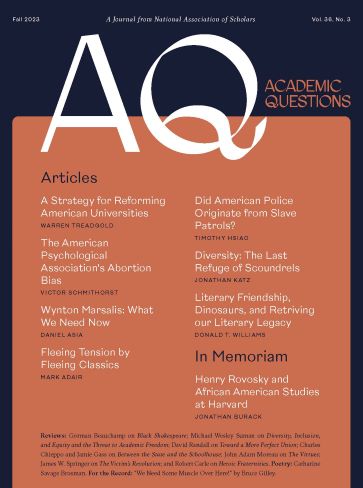Critics of American policing often make the claim that it is a direct descendant of antebellum slave patrols, the mostly voluntary groups organized to capture runaway slaves and stifle slave rebellions in the early eighteenth century. Consider just a few examples:
- “The origins of modern-day policing can be traced back to the ‘Slave Patrol.’” — NAACP1
- “Policing itself started out as slave patrols. We know that.”—Rep. James Clyburn.2
- “Slave patrols . . . morphed directly into police.”—Nikole Hannah-Jones.3
- “[M]odernized police actually emerged in the South during slavery—they literally were slave catchers.”—Scalawag Magazine.4
Even pro-law enforcement organizations such as the National Law Enforcement Memorial and Museum in Washington, D.C. have come to accept this claim.5 According to one criminal justice textbook, it is “widely recognized that law enforcement in the 20th-century South evolved directly from these 18th- and 19th-century slave patrols.”6
While it is true that slave patrols were a form of American law enforcement that existed alongside other forms of law enforcement, the claim that American policing “traces back” to, “started out” as, or “evolved directly from,” slave patrols, or that slave patrols “morphed directly into” policing, is false. This widespread pernicious myth falsely asserts a causal relationship between slave patrols and policing and intimates that modern policing carries on a legacy of gross injustice. There is no evidence for either postulate.
In order to demonstrate causation, one must show that modern policing drew its distinctive practices and structure from slave patrols. But the evidence shows that American law enforcement—whether in the form of sheriffs, town watches, constables, or police—all emerged from distinctly English influences. Both slave patrols and modern police departments drew from these influences. The fact that the latter did so after the former does not mean that the latter emerged from the former.
Police, Policing, and Law Enforcement
To disentangle the history of American police, we must first distinguish between law enforcement in general and police as a form of law enforcement. While the two are often regarded as synonymous, they are not the same. Law enforcement refers broadly to any government agent or agency with the authority to enforce laws, while the term “police” refers specifically to certain entities within this category. Within the United States, law enforcement entities include sheriff’s offices, police departments, constables, marshals, bailiffs, coroners, game wardens, other special jurisdiction entities, and so on. Each form of law enforcement has its own unique lineage, many of which predate colonial America (and, by extension, slave patrols).
We must also distinguish between police or police departments (noun) and policing (verb). Police departments refer to specific entities that engage in the activity of policing— an activity that was well-established long before modern police departments were founded. Early Babylonian, Chinese, Egyptian, Greek, and Roman societies all possessed entities— whether paramilitary, religious, or civilian—that enforced the laws of those societies. 7 Thus policing as an activity has roots that are as ancient as civilization itself.
This point lets us easily dispense with the claim that policing as an activity began with slave patrols. American slave patrols were simply one of many entities throughout history that engaged in the performance of law enforcement duties. They were not the first to do so, nor were they the first to do so in colonial America.
A Brief History of Law Enforcement in the United States
Institutionalized law enforcement in America can be traced as far back as the 1630s with the appointment of sheriffs in counties within the Virginia colony.8 Colonial sheriffs were modeled after their English equivalents and functioned as the chief law enforcement official in their counties. Around the same time, the cities of Boston and New York appointed constables and watchmen to protect lives and property at night. The duties of these individuals “differed insignificantly from their English counterparts.”9
While sheriffs trace their roots to medieval England and were present at the very beginning of colonial America, police departments are a relatively recent innovation in the history of law enforcement. Unlike sheriffs, who exercise jurisdiction over entire counties that may encompass multiple cities and unincorporated areas, police departments are almost always situated within the context of a single municipality and exert jurisdiction only over that county, town, city, or village. While sheriff’s offices and police departments in the United States often coexist with overlapping jurisdictions and functions, the latter are usually subject to municipal oversight while sheriffs are typically elected officials who are autonomous.
American law enforcement developed alongside the needs of the community. The development of professional police departments in large cities in the east was one example of this development, as were the constables and night watches that preceded them. In the American West, vigilantes, regulators, and various forms of private law enforcement arose because of a neglect of law and order on the part of public officials.10 In the American South, slave patrols arose in the early eighteenth century as a means of enforcing laws aimed at regulating slave conduct, returning escaped slaves, and suppressing potential insurrection.11 These slave patrols were sanctioned by local governments and engaged in law enforcement activities. This has led some to make the claim that modern American police descended from slave patrols. Such a claim, however, cannot survive close scrutiny.
Tracing the History of Policing
In order to determine when something began to exist, we must first know its defining characteristics. We can then trace its history back to a cause or event which gave rise to those defining characteristics. Crucially, the mere fact that one similar thing precedes another similar thing in time is not enough to establish causal ancestry.
This point is important, because while slave patrols did precede modern police departments in time, slave patrols did not create police departments as we know them, nor did slave patrols become police departments. The defining characteristic of modern policing and the departments that engage in this practice is the general enforcement of laws by full-time paid and trained individuals who are employed by centralized urban organizations operating under municipal oversight. Modern police departments were entities that were created and structured specifically around this model. Thus, to know when modern police departments began, we must look to the beginning of professional policing.
The historical record clearly shows that professional policing originated from early English advocates of criminal justice reform, most notably Henry Fielding, Patrick Colquhoun, and Sir Robert Peel. Indeed, the first modern police departments in the United States were modeled after London’s Metropolitan Police Service.12 These police departments were the direct successors of the English system (adopted by American cities) of night watchmen and constables.
What distinguished police departments from other forms of early American law enforcement was their professional nature. Police departments as we know them today are highly centralized and are composed of trained individuals who are paid to perform police duties as a career. They arose because the law enforcement needs of large cities became too great for them to rely on volunteers or individuals with minimal training, low motivation, and lack of oversight.13 As urbanization in American cities accelerated, so did disorder. The system of night watches that many cities had historically relied on were ill-equipped to deal with these problems. In response, cities created professional full-time municipal police departments that were regulated by and accountable directly to local governments. These professional agencies, which began in the 1840s, became the police departments we know today. Their immediate precursors were the night watchmen and constables they replaced.
By contrast, slave patrols originated as special militia assignments that exempted individuals from regular duties. These patrols were established for the express purpose of preventing slave insurrection and returning lost slaves to their owners, not general law enforcement. They were not under municipal oversight, nor were their members professionalized. Most slave patrollers were volunteers, and the few who were paid received compensation mostly in the form of rewards for capturing lost slaves. While slave patrols did engage in the activity of enforcing certain laws (namely slave codes), they were “certainly not an example of a modern police organization.”14 Their lineage, purpose, methods, structure, and oversight were completely different.
Slave patrols trace back to the militia system, while police departments trace back to night watches and the Peelian reforms. Slave patrols may have been one kind of law enforcement entity (alongside others), but they did not produce modern police, nor were they a ”transitional” or “intermediate” entity along a continuum within the evolution of policing, with modern police departments being their contemporary descendent.15
It should also be noted that while modern police departments can be classified into a single category based on their commitment to a certain model of policing, each individual police department has its own history. With around 11,800 police departments in the United States, it is surely implausible on its face to say that all police departments owe their existence to slave patrols, especially since many were founded after the Civil War and in contexts and localities that had nothing to do with slavery.16
Some make the more qualified claim that police in the American South descended from slave patrols. Evidence for this is scarce and the number of departments that actually fit into this category are likely to be few, and possibly none. And even this qualified claim can be contested. Most Southern police departments were established after the abolition of slave patrols for reasons completely unrelated to the function of slave patrols. These police departments were established for the purpose of general law enforcement in response to urbanization (and not slave code enforcement), which means that their lineage is the same as other modern police departments rooted in the English tradition.17
The argument might be made that even after the abolition of slave patrols, the fact that many Southern police departments were active in the enforcement of Jim Crow laws supports a link to the slave patrols before them. The same response as before applies. While it is true that many Southern police departments enforced Jim Crow laws, the model of policing they were founded on had nothing to do with slave patrols or Jim Crow enforcement. Policing adapted to the needs of specific communities, and the reason that some Southern police departments enforced Jim Crow laws is simply because that is what the law was in those communities. The British model, when adopted by communities in the postwar South, yielded the results it did not by design, but by circumstance. If the law is unjust, then the enforcement of those laws will obviously be unjust as well. As such, these departments cannot be traced to slave patrols, which were founded specifically for the purpose of enforcing slave codes.
In order to demonstrate causation, one must show that modern policing drew its distinctive practices and structure from slave patrols. But the evidence shows that American law enforcement—whether in the form of sheriffs, town watches, constables, or police—all emerged from distinctly English influences. Both slave patrols and modern police departments drew from these influences. The fact that the latter did so after the former does not mean that the latter emerged from the former.
In Defense of Policing
The claim that modern police originated from slave patrols is a dangerous slur designed to delegitimize policing. The activity of policing (of which modern policing is a subset) derives its legitimacy from the basic good of justice. If it is good to seek justice against criminals/wrongdoers, then the entities that bring them to justice are by extension doing a good thing. The concepts of law and order are intelligible only in light of authorities who make, promulgate, and enforce codes of conduct that are based on reason. If we reject the enforcement of law, we must reject law and order itself. In doing so, we reject civilization.
There is no doubt that law enforcement can be done incorrectly and unjustly. The banner of law enforcement has been used to perpetrate and excuse great evils throughout history. But the existence of bad law enforcement entities at various points in history does not mean that we should reject the pursuit of justice, which requires the enforcement of law and order. If it did, then police critics would lose any moral basis for their own arguments.
Bad policing must be criticized, but we should not do so by resorting to historically flimsy myths, especially myths that unfairly tarnish the reputations of those in law enforcement and cast aspersions on their motives.
Timothy Hsiao is Assistant Professor of Philosophy and Humanities, University of Arkansas Grantham; [email protected]. His website is https://timhsiao.org. Hsiao last appeared in AQ with “The Lived Experience Fallacy” in the summer 2022 issue.
1 NAACP, “The Origins of Modern-Day Policing,” https://naacp.org/find-resources/history-explained/origins-modern-day-policing.
2 “House Majority Whip James Clyburn dismisses President Trump's efforts on police reform,” Fox News Special Report, June 16, 2020, https://www.foxnews.com/video/6164673557001#sp=show-clips.
3 “Pulitzer Prize-winning journalist Nikole Hannah-Jones on protesting and democracy” CBS This Morning, https://www.cbsnews.com/video/pulitzer-prize-winning-journalist-nikole-hannah-jones-on-protesting-and-democracy/#x.
4 Neal Shirley, Saralee Stafford, “Where do the police come from?” Scalawag Magazine, https://scalawagmagazine.org/2016/09/where-do-police-come-from.
5 National Law Enforcement Memorial and Museum, “Slave Patrols: An Early Form of American Policing,” https://nleomf.org/slave-patrols-an-early-form-of-american-policing.
6 Karen Hess, Christine Orthman, Henry Cho, Introduction to Law Enforcement and Criminal Justice, 12th ed. (Boston, MA: Cengage, 2018), 15.
7 Clive Emsley, A Short History of Police and Policing (New York, NY: Oxford, 2021), ch 1.
8 Roger Scott, “A Historical Perspective of the Office of Sheriff,” National Sheriffs’ Association, https://www.sheriffs.org/about-nsa/history/roots.
9 David Johnson, American Law Enforcement: A History (Arlington Heights, IL: Forum Press, 1981): 5.
10 Johnson, ch. 6. Also see Chris McNab, Deadly Force: Firearms and American Law Enforcement (New York, NY: Osprey, 2009), ch. 1.
11 Victor Stolberg, "Slave Patrols" in W. Miller (ed), The Social History of Crime and Punishment in America: An Encyclopedia (Thousand Oaks, CA: SAGE Publications, 2012).
12 “The police precedent for the United States, as is well known, came from the establishment of the Metropolitan Police of London in 1829.” See Eric Monkkonen, “History of Urban Police” in M. Tonry, N. Morris (eds) Crime and Justice vol 15, Modern Policing (Chicago, IL: University of Chicago Press, 1992), 549.
13 Ibid., ch. 2.
14 Philip Reichel, "Southern Slave Patrols as a Transitional Police Type," American Journal of Police 7, no. 2 (1988): 65.
15 While Reichel agrees that slave patrols did not resemble modern police, he nevertheless argues that they constituted a “transitional type” in the history of police. The problem with this view is that the assumption of causal ancestry is simply smuggled in on the basis of one preceding the other. Slave patrols were a style of policing (much like regulators or committees of vigilance in the American West) that came before modern police. This does not at all imply that they produced modern policing.
16 Sean Goodison, "Local Police Departments Personnel, 2020" Bureau of Justice Statistics, (November 2022), https://bjs.ojp.gov/sites/g/files/xyckuh236/files/media/document/lpdp20.pdf.
17 See Eric Monkkonen, "From Cop History to Social History: The Significance of the Police in American History," Journal of Social History 15, no. 4 (1982): 578.














